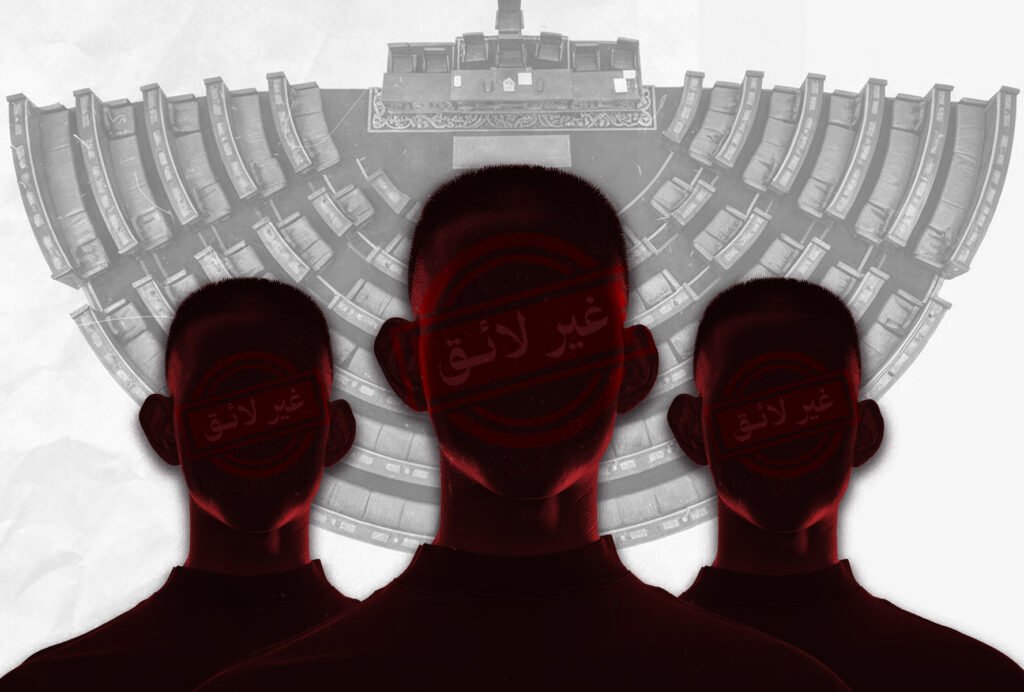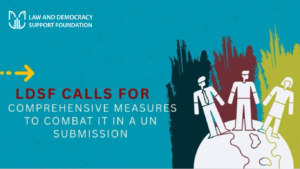
After Seizing Control of the Senate, the “State List” Runs Uncontested in the House of Representatives Elections
Law and Democracy Support Foundation (LDSF) and HuMENA for Human Rights and Civic Engagement condemn the systematic political exclusion of opposition forces in Egypt, and the deliberate denial of the right of opposition and independent candidates to participate in parliamentary elections. The organizations further denounce the Egyptian authorities’ continued closure of the public sphere and restriction of the right to political participation, which effectively limits electoral competition to a narrow segment of candidates who enjoy the support or approval of state institutions.
The Egyptian authorities are preparing to hold elections for the House of Representatives in November and December 2025, in an atmosphere similar to that of the recent Senate elections, which ended with complete state control over the chamber. Once again, the “National List for Egypt” is running uncontested and is expected to win all list-based seats by acclamation, following the authorities’ exclusion of all competing electoral lists, as well as the disqualification of several prominent independent candidates running for individual seats.
On October 23, 2025, the National Elections Authority also disqualified the electoral lists of the “Generation Party,”“Popular List – Your Voice for Egypt,” and “Call of Egypt” from competing in the House of Representatives elections. In addition, 181 individual candidates were excluded from running for office — among them public figures, members of opposition parties, and former parliamentarians.
Notably, the disqualified candidates included former MP Haitham El-Hariri and politician Mohamed Abdel Halim Ali, both from the Popular Socialist Alliance Party, as well as three candidates from the Al-Nour Party. Furthermore, Mohamed Abu El-Diyar, the former spokesperson for the presidential campaign of Ahmed Tantawy, was removed from the voter registry, thereby denying him his right to stand for election.
The Senate elections, held in August 2025, witnessed the exclusion of 41 candidates from the final list of individual-seat nominees, on grounds that the authorities claimed were related to their failure to meet candidacy requirements. Meanwhile, the list-based system saw the elections conducted with only one participating list — the “National List for Egypt” — a coalition of parties led by the pro-government “Future of the Nation” Party, which openly supports President Abdel Fattah al-Sisi.
The results announced in August 2025 revealed complete state control over the Senate, with an official voter turnout of only 17%, according to the National Elections Authority. The government-backed “National List for Egypt” won all 100 list-based seats uncontested, while its candidates secured around 95% of the 100 individual seats. In addition, the President’s appointment of 100 members granted the state absolute dominance over the 300-member chamber.
The exclusion of former MP Haitham El-Hariri was justified on the grounds of alleged irregularities in his military service status, despite his legal team submitting an official document from the Ministry of Defense confirming his exemption from conscription under Law No. 127 of 1980—the same exemption that had allowed him to run in the 2015 elections, in which he reached the runoff stage. This decision undermines the verification standards of the National Elections Authority and raises serious doubts about its adherence to legal candidacy guarantees.
As for candidate Mohamed Abdel Halim Ali, he was excluded based on a controversial drug test, despite subsequently presenting a negative result issued by the same medical authority, calling into question the integrity of procedures and the neutrality of the administrative body. The same pretext—failure to perform military service—was used to disqualify three candidates from the Al-Nour Party, including Mostafa Khalifa, the party’s vice president. In another case, Ahmed El-Sherbiny, a member of the Al-Dostour Party, was initially disqualified but later reinstated after his appeal was accepted, as confirmed by the party.
Similarly, lawyer Mohamed Abu El-Diyar, the former spokesperson for presidential candidate Ahmed Tantawy’s campaign, announced that his name had been deleted from the voter registry, preventing him from running or even voting, despite holding an official certificate confirming his inclusion. His appeal against the exclusion was rejected on the basis of an in absentia court ruling in the so-called “Ahmed Tantawy Power-of-Attorney Case,” which had been referred to by the Supreme State Security Prosecution. This incident highlights the urgent need for an independent audit of the voter registry, alongside the establishment of a rapid, documented, and transparent correction mechanism to prevent the arbitrary revocation of political rights through administrative decisions.
These developments take place within a broader context of systematic restrictions on the right to political participation and party pluralism that have persisted for more than a decade. Following the political shift of July 2013and the subsequent rise of Abdel Fattah al-Sisi to the presidency, Egypt has witnessed one of the most severe periods of democratic regression in its modern history.
This period has been marked by widespread repression of freedom of expression and media freedom, the prosecution of civil society organizations, and attempts to impose tight security control over their activities, in addition to the suppression of the right to peaceful assembly.
This repressive pattern has also extended to politicians who announced their intention to run in successive presidential elections, most recently former MP Ahmed Tantawy, who — along with members of his campaign — faced judicial harassment and imprisonment after being barred from running in the 2023 presidential elections.
This has been accompanied by a series of laws, legislative amendments, and practices that have undermined the democratic process, restricted political participation, and curtailed the formation of political parties and independent unions, while tightening state control over the media and civil society. These measures have collectively led to the imprisonment or exile of hundreds of activists and politicians. Among the most significant were the constitutional amendments passed following a highly disputed 2019 referendum, which expanded President al-Sisi’s powers and extended his term limits. In addition, a raft of restrictive laws—including the Trade Unions Law No. 213 of 2017 (and its amendments), the Civil Service Law No. 18 of 2015, the Media Regulation Law No. 180 of 2018, the Cybercrime Law No. 175 of 2018, the infamous Protest Law No. 107 of 2013, the Anti-Terrorism Law No. 94 of 2015, and the Law on Associations and Civil Society Organizations—has further eroded basic rights and freedoms. Together, these laws have drawn strong criticism from civil society organizations and political forces for their inconsistency with constitutional principles and international human rights standards.
This escalation comes at a time when the Egyptian authorities are seeking to polish their international image through the newly announced “Comprehensive Strategic Partnership” with the European Union (EU Summit, 22 October 2025). However, the exclusion of opposition candidates exposes a stark contradiction between the government’s official rhetoric and its domestic practices. Human rights groups have urged EU leaders to make human rights a core condition of any strategic partnership with Egypt, emphasizing that “stability cannot be achieved without respect for civil and political rights.”
Despite official promises of holding “pluralistic elections,” the pattern that has persisted since the 2019 and 2024 presidential elections and the previous parliamentary polls reveals a closed electoral system effectively controlled by security agencies, with no genuine competition or independent judicial oversight. The same practices continue to recur — including arbitrary rejection of candidacy applications on baseless grounds, security pressures on campaign teams, and systematic smear campaigns against opposition figures — rendering any notion of equal opportunity impossible under the current political climate.
In addition to violating Egypt’s international obligations, these practices constitute a clear breach of the Egyptian Constitution, whose Articles (4), (5), (87), and (94) affirm that sovereignty belongs to the people, that the political system is based on pluralism, that participation in public life is both a right and a national duty that cannot be revoked, and that the rule of law is the foundation of governance.
Articles (92) and (93) of the Constitution further stipulate that rights and freedoms may not be suspended or diminished, and that the state is bound by the international treaties it has ratified, foremost among them the International Covenant on Civil and Political Rights (ICCPR), whose Article 25 guarantees every citizen’s right to take part in public affairs and to stand for election in free and fair polls.
These practices also represent a violation of the National Elections Authority’s obligations under Law No. 198 of 2017, which requires the Authority to maintain full neutrality, ensure equality and equal opportunity among all candidates, uphold transparency, make electoral information publicly accessible, and guarantee candidates the right to appeal within clear and binding deadlines.
Furthermore, such conduct contradicts the provisions of the Law on the Exercise of Political Rights (Law No. 45 of 2014)—particularly those concerning the integrity of voter rolls and the right to appeal—as well as Article 13 of the African Charter on Human and Peoples’ Rights, which guarantees every citizen the right to participate freely in the conduct of public affairs in their country.
The Senate, re-established in 2020, was initially intended to serve as a genuine platform for legislative pluralism and national dialogue, yet it has effectively become a symbolic body used to embellish an otherwise closed political landscape. Similarly, the House of Representatives has abandoned its constitutional oversight and legislative role, as outlined in Articles (101) and (102) of the Constitution, and has instead turned into an institution that rubber-stamps executive decisions without meaningful scrutiny.
The political climate that the Egyptian authorities insist on maintaining around the 2025 elections demonstrates their determination to treat the electoral process as a mere procedural exercise, rather than a mechanism for peaceful power transfer or genuine constitutional accountability. The ongoing preparations for the 2025 parliamentary elections indicate a reproduction of the same system of control that prevailed in the 2015 and 2020 cycles, with independent and opposition voices excluded early on—effectively stripping both chambers of genuine popular representation and undermining the principle of separation of powers.
This simultaneous decline in the role of both legislative bodies has reduced parliamentary life to a mere façade, entrenching the concentration of power in the hands of the executive and security apparatus — in blatant violation of the republican and democratic principles enshrined in the Constitution. The continuation of this pattern effectively strips electoral processes of their constitutional substance and undermines the principle of peaceful power transfer, necessitating immediate corrective measures to restore integrity and ensure genuine democratic governance.
Law and Democracy Support Foundation (LDSF) and HuMENA for Human Rights and Civic Engagement call on the Egyptian authorities to take the following actions:
1. Electoral Process
- Immediately halt all exclusion decisions and reinstate all disqualified candidates without delay.
- Ensure a fair and transparent electoral environment that guarantees equal opportunity for all candidates.
- Allow local and international civil society organizations to monitor the elections freely and without restrictions.
- End the misuse of the judiciary and public prosecution to eliminate political opponents, and ensure that appeals are reviewed by independent and impartial courts.
- Guarantee full judicial supervision over all stages of the electoral process, and make electoral data and information publicly accessible in a transparent manner.
2. Civic and Political Rights
- Cease security interference that closes the public sphere and undermines political pluralism.
- Immediately release all journalists, human rights defenders, and political activists detained in connection with opinions or peaceful political activities.
- Guarantee freedom of publication and political expression without intimidation or prosecution.
- End security censorship over the media, lift the ban on independent news websites, and enable media outlets to operate freely.
- Allow political parties, professional associations, and independent labor unions to carry out their activities without interference or security restrictions.
- Lift restrictions on public meetings and peaceful assemblies, and ensure the constitutional right to peaceful protest.
3. Legislative Reforms
- Uphold the Constitution and international obligations, particularly Article 25 of the International Covenant on Civil and Political Rights (ICCPR).
- Amend restrictive laws, including the infamous Protest Law, the NGO Law, the Anti-Terrorism Law, and the Cybercrime Law, to bring them in line with human rights standards.
- Involve civil society organizations, political parties, and trade unions in the process of drafting legislation and shaping public policy.






